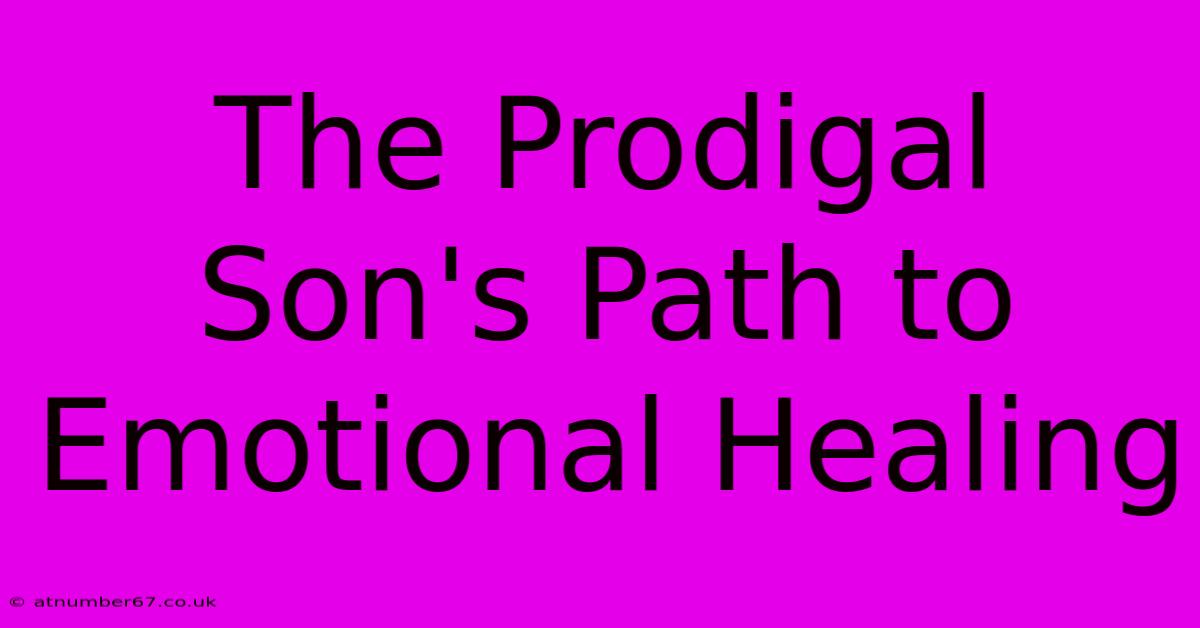The Prodigal Son's Path To Emotional Healing

Table of Contents
The Prodigal Son's Path to Emotional Healing: A Journey of Forgiveness and Self-Discovery
The parable of the Prodigal Son resonates deeply because it speaks to the universal human experience of making mistakes, feeling lost, and seeking redemption. While often interpreted as a purely religious story, its core message offers profound insights into the emotional healing process, a journey applicable to anyone grappling with regret, shame, and the desire for self-acceptance. This article explores the emotional stages of the Prodigal Son's journey, offering guidance for those on their own path to healing.
Understanding the Emotional Landscape
The Prodigal Son's story isn't just about a wayward son returning home; it's a narrative of emotional turmoil and the arduous climb back to self-worth. His initial departure represents a flight from responsibility, a yearning for freedom that quickly morphs into disillusionment and despair. This mirrors the feelings many experience when making significant life choices that lead to regret.
Stage 1: The Rebellion and the Fall
The initial rebellion, fueled by a desire for independence and perhaps a sense of entitlement, leads to a period of reckless abandon. This stage is characterized by:
- Impulsivity and poor decision-making: The Son squanders his inheritance on fleeting pleasures, highlighting the pitfalls of unchecked desires.
- Shame and self-loathing: As the consequences of his actions become apparent, feelings of guilt and self-condemnation overwhelm him.
- Isolation and loneliness: The emptiness of his choices leads to profound isolation, highlighting the inherent loneliness of self-destruction.
Stage 2: The Rock Bottom and the Turning Point
The Prodigal Son's descent into poverty and despair marks a crucial turning point. This stage involves:
- Facing the consequences: The harsh realities of his choices force him to confront the depth of his mistakes.
- Humility and self-reflection: He is stripped of his pride and forced to examine his actions and their impact.
- A glimmer of hope: Amidst the despair, a nascent desire for change begins to emerge, a recognition that his current path is unsustainable.
Stage 3: The Return and the Embrace of Forgiveness
The Son's decision to return home signifies a powerful act of self-acceptance and a willingness to face judgment. This stage includes:
- Vulnerability and courage: Returning home requires immense courage and a willingness to be vulnerable before his family.
- Seeking forgiveness: His plea for forgiveness represents a deep desire for reconciliation and acceptance.
- The transformative power of grace: The father's unconditional love and forgiveness act as a catalyst for healing.
Emotional Healing: Practical Steps
The Prodigal Son's journey offers a blueprint for our own emotional healing. To embark on this path, consider these steps:
- Acknowledge your mistakes: Honesty and self-awareness are crucial first steps. Don't shy away from confronting the pain and regret associated with past actions.
- Practice self-compassion: Be kind to yourself. Recognize that everyone makes mistakes, and that forgiveness starts with forgiving oneself.
- Seek support: Share your struggles with trusted friends, family, or a therapist. Support networks provide crucial guidance and encouragement.
- Focus on personal growth: Use the experience as a catalyst for positive change. Identify areas for improvement and work towards becoming a better version of yourself.
- Embrace forgiveness: Forgiveness, both of yourself and others, is essential for moving forward. This is not about condoning harmful actions, but about releasing the burden of resentment and anger.
Conclusion: A Journey of Self-Discovery
The Prodigal Son's path is a powerful metaphor for the journey of emotional healing. It reminds us that even after making significant mistakes, there is always the possibility of redemption, forgiveness, and a renewed sense of purpose. It's a journey of self-discovery, one that requires courage, vulnerability, and a willingness to confront the past and embrace the future. Embracing these steps, we too can find our way back to a place of peace, acceptance, and self-worth.

Thank you for visiting our website wich cover about The Prodigal Son's Path To Emotional Healing. We hope the information provided has been useful to you. Feel free to contact us if you have any questions or need further assistance. See you next time and dont miss to bookmark.
Featured Posts
-
The Fascinating Life Of Michael Polansky Age Included
Apr 14, 2025
-
Birthday Card For Dad Simple Elegant And Thoughtful
Apr 14, 2025
-
Jonty Rhodes Age A Legacy Of Athletic Excellence
Apr 14, 2025
-
Aiman Khans Daughters Family Vacation
Apr 14, 2025
-
The Secret Behind Kim Soo Hyuns Massive Net Worth
Apr 14, 2025
